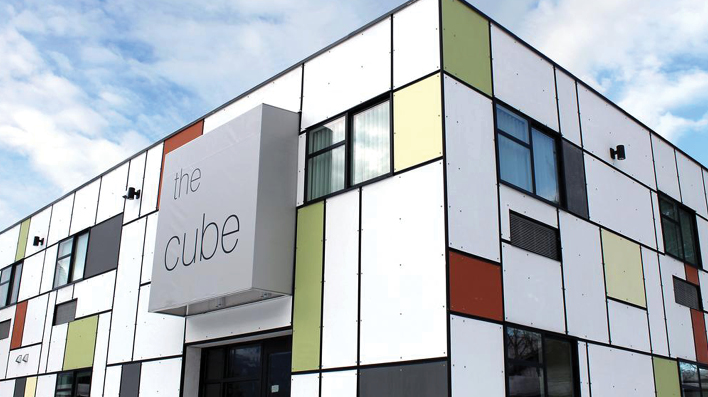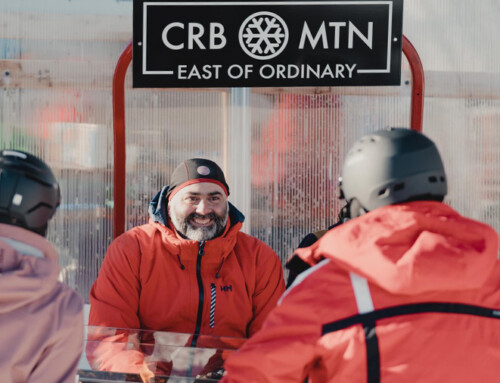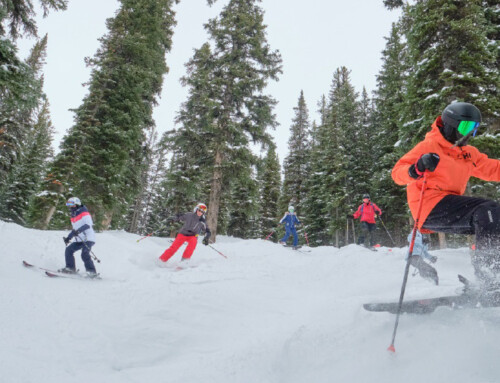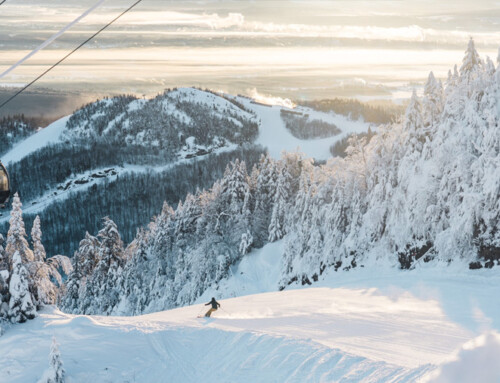By ski journalist, author and blogger Louise Hudson
Today’s major motif for mountain hotels is bijoux, boutique, functional but fabulous, and decidedly social. Like the ‘tiny house’ trend touted on TV programs like Tiny House, Big Living, ski resort accommodation is getting smaller and more specialized. With cheap and cheerful AirBnBs taking business from bland big box hotel chains, savvy ski town hoteliers are competing with more intimate, designer-decorated settings. Whether boutique bed and boarding like the new Limelight Hotel Snowmass or artsy and affordable like The Cube, they are the niftiest newcomers on the block.
The smallest slopeside sanctuary around is probably Canada’s first pod hostel-hotel, the Pangea Pod Hotel at Whistler Blackcomb which opened last season. Owners, Russell and Jelena Kling say: “We’re not a hostel. We’re not a hotel. We’re the best of both worlds.” While guests have their own teensy territory to relax and sleep in, everything else is shared. “This ‘chic shared’ concept is changing the face of the travel industry in North America, and is setting a trend towards alternative accommodation worldwide,” says Jelena Kling. “Pangea is geared towards solo budget travellers, giving them the opportunity to experience all that Whistler has to offer without breaking the bank and without having to forego both the key elements of privacy and a first-rate location, both of which hostels simply do not provide.”
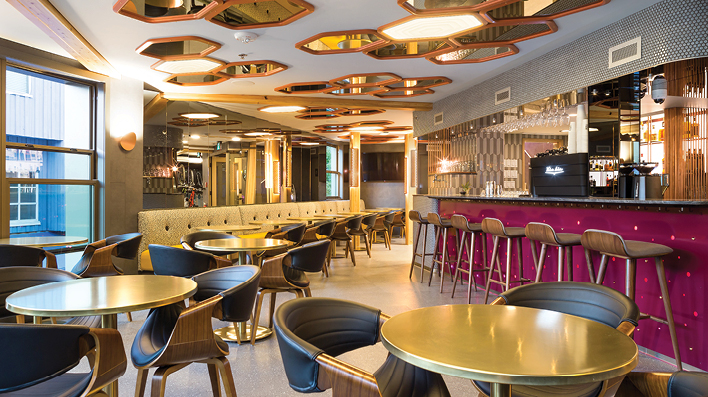
Satisfying the main Millennial priorities, the Pangea Pod Hotel offers hip designer accommodation – in wood-lined pods with memory foam double mattresses and high-end linens – that is inexpensive, central and sociable. It’s a high-altitude holiday hub where like-minded travellers mix and mingle over an espresso or craft beer in The Living Room or a shaken cocktail before dinner at The Rooftop Patio – Whistler’s only rooftop deck. Although sleeping quarters are petite, there are storage options in the suites themselves, as well as additional space for larger items like skis and snowboards in the ‘Toy Box’ area.
One of the most creative motel rebuilds in recent years is in the town of Jackson, where a lack-lustre low-end motel morphed into the Mountain Modern Motel with a lick of paint and a lot of inspiration. The typical motel format has been reinvented in this 135-room complex with trending dark grey cladding, metal and bright red accents, with distinctive bison sculptures drawing further attention. “The entire property was renovated from floor to ceiling. New design features, amenities, bedding, décor, etc. It’s like a brand new property, with an excellent location in Jackson,” says Spencer Long, Sales Manager for MMM. “We offer great value all year long, but the winter months are definitely more affordable.” Long thinks that motels are making a comeback: “We’re making it cool to stay in a motel again. Similar to the days of travelling down Route 66 and staying at a roadside inn, the Baby Boomer generation feels a sense of nostalgia bringing back memories of the family road trip.” It also appeals to Millennials and younger generations, he adds, due to its aura of authenticity and playful vibe that reflects the spirit of the area. “The property is designed with the adventurer in mind, with practical spaces for storing your gear and a uniquely modern design and décor,” he says. All at a great value with complimentary grab-and-go breakfast and shuttle service to Jackson Hole.
RED Mountain is reflecting both ends of the spectrum with two new properties. A cutting-edge hostel, comically called Nowhere Special, opened there on December 18. “RED Mountain Resort has torn a page from world-class destinations like London and Barcelona that have taken travel to a new level by redefining what a hostel can be,” says Howard Katkov, RED’s CEO. “Nowhere Special starts at just $40/bed and is a mere two-minute walk from the base lodge, purpose-built for today’s modern fuss-free traveller. This new accommodation will put RED on the radar of young, young-at-heart, and adventurers who value community, connection, and careful curation.” Nowhere Special was crafted to deliver the best in clean, modern design and usability while catering to practicalities like the indoor bike and ski storage and an outdoor fire pit with two gas grills. The range of floor plans include shared rooms sleeping four with en suite bathroom for each eight as well as private rooms.
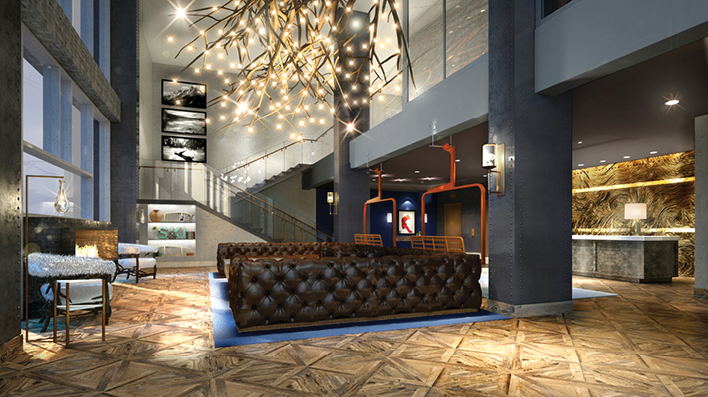
At the higher-end is The Josie, a boutique ski-in, ski-out hotel located right at the base of RED Mountain. New this season, the motif is modern-meets-mountain-adventure, encapsulating the stunning views with floor-to-ceiling windows, and using recycled local wood panelling and earthy tones to bring the outside in. “We hope to attract skiers and adventurers seeking a true, authentic mountain experience to The Josie,” says Marketing Manager, Liz Day. “The laid-back, hospitable nature of Rossland and its residents are reflected throughout the hotel with our personalized service and warm, welcoming atmosphere.” As well as plush beds, soaker tubs, heated floors, ski concierge and spa, The Josie is also appealing to trendy taste buds. With a focus on locally-inspired craft cooking, the culinary team at The Velvet Restaurant and Lounge is working with a dedicated community of local suppliers, farmers, producers and vineyards from the West Kootenays. Welcoming hotel guests and lucky locals alike, the menu features subtle French influences, offering diverse dishes, including vegetarian, vegan and gluten-free.
Revy’s Mondrian-themed boutique hotel was designed by artist Louis-Marc Simard. The Cube has fluctuated between being called a hostel and a boutique hotel. Simard said it only really took off when he changed the name from hostel to hotel: “I wanted a hostel for grownups, with all the basic comforts – private washroom, good TVs, good bed, good soundproofing – but also the convivial atmosphere that a common area and a full kitchen facilitates.” With his colourful cuboid concept – and a ‘Dare to be Different’ mantra – the hostel really stands out in the mountain town of Revelstoke, attracting everyone from 25-65. “I was happy to rehabilitate an existing building, and my main purpose was to offer an alternative to expensive, ‘glamorized’ accommodations that charge a premium to make the guest feel like royalty,” says Simard. “That trend, very prevalent in the hotel industry, makes some guests consider our option as ‘inferior’, since our rooms are small and showers are in the hallway, but we feel we show our guests tremendous respect by offering a good room at half the cost of a regular room.” Breakfasts – including waffles, muffins, bagels, fruit, cereals, juice and fresh coffee and tea – are free and there are board games, books and examples of Simard’s art in the cosy lounge area. Other perks include a drying room for gear and – a complimentary ski shuttle pass to the nearby slopes. Simard says it is also more environmentally-friendly: “Shared showers using less water, smaller rooms using less energy, renovating and re-using an existing building and more efficient heating.”
Tourism Revelstoke’s Marketing Manager Meghan Tabor says that The Cube is part of general gentrification of the town, complementing Revy’s innovative vibe. Feedback about the hotel/hostel hybrid always focuses on reasonably priced, quirky, modern and clean, with lovely sociable communal areas for meeting fellow travellers. The Cube offers “uniqueness, a great downtown location, and alternatives to your run of the mill lodging,” says Tabor: “Unique accommodation which deserves considerable credit for the part they are playing in Revelstoke’s revitalization as a topnotch resort community.” The Cube is speaking to today’s ‘modern traveller’, she adds, craving interesting experiences in every aspect of their trip.
The Bivvi Hostel in Breckenridge uses its public space to encourage social interaction. The property describes itself on its website as “basically a hotel with more shared space. All this shared space is the fibre for shared stories, shared experiences, and new friends!” General Manager Balazs Jarai said the idea behind the hostel was to provide something more affordable, but also to attract like-minded people who want to hang out at the library, bar, hot tube and firepit. “There wasn’t a hostel in town until we opened three years ago,” says Jarai. “But the concept has really taken off.” Jarai says the hostel is appealing to different age groups and nationalities, but that they all tend to be sociable and open-minded. “We have everything from 18-year-old backpackers to 65 year-olds willing to use bunk-beds. So we see plenty of diversity and guests can guarantee to meet interesting people from around the world – in fact, we have a lot of guests who end up connecting on Facebook and staying friends for life.” Jarai sees a trend in the US towards this type of accommodation. “The hostel idea is quite new to North America, but I think we will see more high-end ‘boutique-style’ hostels that are affordable but cater to the demand for something a little more unique and authentic.”
Aspen’s latest boutique hotel, the Limelight Hotel Snowmass, opened for business this November, sporting 99 hotel rooms, 11 for-sale condominiums, a new restaurant, a children’s game area and a five-storey climbing wall that is open to the public. Modelled after the company’s existing properties in downtown Aspen and Ketchum, Idaho, the hotel is ski in/out via Snowmass Mountain’s Elk Camp Gondola. Just like its sister hotels, the Snowmass Limelight has après ski deals in the Lounge, affordable pricing, and live music five nights a week, sure to make it a lively hub for locals and visitors. The décor theme is contemporary but casual, with a sociable focus on the large lounge, two pool spas with cabanas and fireplace, kids’ room, fitness centre, ice rink, and Colorado’s tallest indoor rock climbing wall. Other perks include the complimentary First Tracks and Inside Tracks programs, ski concierge and free breakfasts.
While boutique hotels are mostly modern in motif, some older properties also qualify, especially those undergoing ‘trendification’ of tired décor and amenities. Built in 1889, the 97-room historic Hotel Jerome is focusing on updating its shared space. Renovations include conversion of the 140-year-old Aspen Times printing house into a character-rich event space, revitalizing the outdoor living space, and adding a seductive new underground bar – Bad Harriet – beneath the street-level former newspaper building. With ritzy room renos this year, Lake Louise Inn is veering towards boutique ranking. A total of 36 junior suites and summit queen rooms have been renovated to ‘HGTV’ standard, with condos and lofts following next summer. Its shared space has always been a social hub with a central swimming pool and hot tubs, two restaurants and a pub that attracts all the local seasonal workers as well as visitors from around the village. Director of Sales & Marketing, Channin Liedtke says that it all exudes a feeling of comfort. “There’s a real feeling of home at the hotel: walk into a junior suite and it’s nearly impossible as a couple or family to feel like you’re not home,” he explains. “The same applies for the lobby or even the hot tubs and pool. It is nearly impossible to not strike up a conversation with people in the pool, learn about them, and probably go for a drink afterwards. That’s the feeling at the Lake Louise Inn. And it’s so perfect because our tagline is ‘connecting through nature’ which really is accurate and speaks for itself.”
It’s much easier to convert an existing property into a design-led boutique hotel, especially as there is no big brand to inflict standardization on minimum room sizes and layout. The growth in demand for boutique hotels – generally considered to have less than 100 rooms – started in 2014 when they accounted for only three percent of the hotel market. That figure has already increased as consumer habits continue to drive it. Hotel guests everywhere are seeking unique experiences as opposed to commoditized products and are more sensitive to design, levels of service, a more customized memorable experience and quality of food. Panorama Mountain Resort intends to fill this recipe with its plans to re-invent The Pine Inn. “We going to create a refreshed hotel here on the site of the Pine Inn,” says CEO, Steve Paccagnan. “We’ve seen the emerging trend of refurbs in hotels and motels, and are doing a lot of our own research, looking at the Base Camp idea in Tahoe and Mountain Modern in Jackson Hole as examples for inspiration.” Panorama is tallying all the trends and bearing in mind Millennial needs as it plans out the new look for the Pine Inn. “We’re looking at really ergonomically designed rooms, where the lobby becomes the main focus,” Paccagnan explains. “Think microbrewery with bowling, like High Rollers in Banff, a really good bar, and several social areas, stage and music.”



